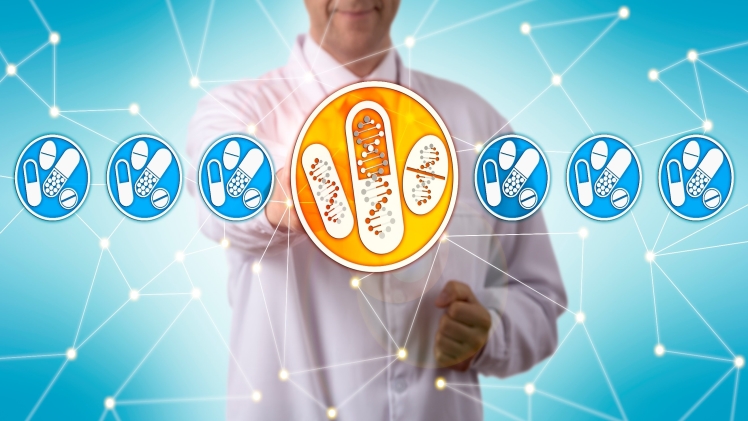In 2003, the Human Genome Project announced that it had successfully mapped the human genome as part of a comprehensive study of our DNA. This genetic information is stored in our cells and can be described as a set of instructions for making a human. The recreated sequence does not come from a single individual. Rather it is a representative example, one that was composed using blood samples from nearly 100 volunteers. The findings of this project are now publicly available and are a valuable resource for biomedical scientists worldwide. It is a field known as genomics and involves the study of human genes, how they interact with each other, and how they are affected by the wider environment.
What is pharmacogenomics?
Pharmacogenomics is a branch of genomics that is concerned with understanding how a person’s genome will affect their health and reactions to medication. Slight variations in an individual genome can result in a medicine working exceptionally well or being useless to a patient’s recovery. Moreover, some people can experience extreme side effects from medications that others tolerate well. For a limited number of patients, these can be life-threatening. However, with testing and guidance from pharmacogenomics, physicians can make safe choices when giving and dosing medication.
Improving patient outcomes
This fascinating and essential field has a huge impact on patient care and outcomes. As a result, it is a constantly expanding area of science. People planning a career in pharmacogenomics can study for a pharm d online in the distance Doctor of Pharmacy program at the University of Findlay. This four-year course includes on-campus placements, remote coursework, and experimental study to fully prepare students for professional roles in the pharmaceutical industry.
How are pharmacogenomics tests conducted?
Patients can undergo pharmacogenomics testing in several ways. Blood tests are the most commonplace. These are carried out the same way as any other blood test, with the sample collected through a needle and stored in a vial until it reaches the clinic. Saliva tests are another option, and here the clinician simply collects a sample in a tube using a special pad. The third test offered is the cheek swab, which involves a tester rubbing the inside of a patient’s cheek with a cotton swab to collect a cell sample.
Which patients benefit the most from pharmacogenomics testing?
Patients starting a course of certain medicines are likely to be tested on the orders of their physician. Doctors might also resort to testing for patients who are not improving, despite a course of treatment. Finally, testing is also carried out when a patient has experienced a side effect that is particularly rare and serious. Not all medicines have a corresponding pharmacogenomics test. Those which are most frequently prescribed in conjunction with testing include the blood thinner warfarin, an epilepsy treatment called carbamazepine, and abacavir, which is an HIV treatment.
How does pharmacogenomics make medicine more personal?
The majority of drugs are designed with every patient in mind, but this generalized approach is not ideal. By personalizing a treatment plan and the drugs a patient is given, practitioners can lower the risk of adverse reactions and the associated costs . Therefore, although genomic testing is complex and costly, its benefits are certainly worthwhile. By prescribing safe and effective medications in the first instance, physicians can reduce drug waste, cut hospital readmissions, and free up more time for clinicians.
In the future, pharmacogenomics can likely be harnessed even further to design customized medications for some of the most common chronic illnesses. From cancer to heart disease and asthma, sufferers could be given an optimized treatment that improves their condition while causing few or no side effects.
The key ways in which pharmacogenomics is used
While the most advanced therapies could take 10-12 years to perfect, we are already benefitting from pharmacogenomics in two main ways.
Lowering the risk of adverse reactions
An allele is a variation in a person’s genome, and it is easy to pick up through testing. When a physician knows that their patient has a particular allele, they also know this person will react differently to certain medications. Specifically, the patient is likely to have a bad reaction compared to the general population. Knowledge of this and other gene variants can be considered by physicians before they design a course or treatment or prescribe a drug.
Selecting the right dose for each patient
The speed at which a drug is metabolized by the body and begins to take effect varies from patient to patient. In some people, this can lead to a medication moving through the body so quickly that it does not have time to treat their condition. In other patients, certain drugs can be metabolized very slowly. This can lead to medications building up to a harmful extent in a patient’s system. As a result, the treatment itself becomes toxic, and the patient feels even worse.
A common example is thiopurines, a group of immunosuppressive, anti-inflammatory drugs. They are an effective treatment for a range of conditions, from inflammatory bowel disease to leukemia.
Pharmacogenomics testing in patients prescribed thiopurines often revolves around looking for a TMTP (thiopurine methyltransferase) gene, as it is crucial for metabolizing the drug. Although only a small percentage of the population lacks the gene, those who do will become very ill if given a normal course of thiopurines. Therefore, armed with a patient’s test results, a physician can prescribe a lower dose or choose another medication altogether.
The advancement of genetic testing
Almost every condition that we suffer from has its origin in our genes. For many years, doctors have used genetic testing to screen for congenital disabilities in an unborn child, along with a couple of other relatively common ailments, such as sickle cell anemia. Now, more advanced screening, based on pharmacogenomics, warns clinicians about a person’s hereditary risks, and also allows them to prescribe the most useful medication in the initial stages of a disease dstvportal.

